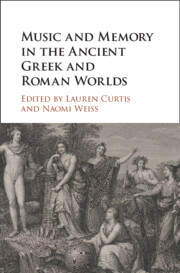Book contents
- Music and Memory in the Ancient Greek and Roman Worlds
- Music and Memory in the Ancient Greek and Roman Worlds
- Copyright page
- Contents
- Figures
- Contributors
- Acknowledgments
- Note on Texts and Abbreviations
- Part I Approaching Music and Memory
- Introduction
- Chapter 1 Music, Memory, and the (Ancient Greek) Imagination
- Part II Music, Body, and Textual Archives
- Part III Technologies of Musical Memory
- Part IV Audience, Music, and Repertoire
- Part V Music and Memorialization
- Bibliography
- General Index
- Index Locorum
Chapter 1 - Music, Memory, and the (Ancient Greek) Imagination
from Part I - Approaching Music and Memory
Published online by Cambridge University Press: 14 October 2021
- Music and Memory in the Ancient Greek and Roman Worlds
- Music and Memory in the Ancient Greek and Roman Worlds
- Copyright page
- Contents
- Figures
- Contributors
- Acknowledgments
- Note on Texts and Abbreviations
- Part I Approaching Music and Memory
- Introduction
- Chapter 1 Music, Memory, and the (Ancient Greek) Imagination
- Part II Music, Body, and Textual Archives
- Part III Technologies of Musical Memory
- Part IV Audience, Music, and Repertoire
- Part V Music and Memorialization
- Bibliography
- General Index
- Index Locorum
Summary
This chapter surveys archaic and classical Greek ideas about music and memory. It first asks why song-producers and audiences, while readily acknowledging the effectiveness and value of music’s verbal components as preservers and enhancers of memory, do not seem to recognize the purely musical elements as being especially “memorable.” Second, I turn toAristotle, seeking to piece together how he thinks music – along with “voice” and sounds in general – functions in relation to memory, primarily through the psychological-somatic workings of the human “imagination,” i.e., his notions of affect (pathos) and phantasia. Even while Aristotle does not address musical memory directly, his work provides a sophisticated account of the material and physiological processes whereby hearing and memory operate in humans and other animals – adumbrating modern accounts based on a more accurate understanding of neurology and cognition. At the same time, since ancient music was experienced live (rather than through recordings or broadcasts) and could never be exactly repeated, there existed a different relationship between present and past in music-listening than most of us are used to today.
- Type
- Chapter
- Information
- Music and Memory in the Ancient Greek and Roman Worlds , pp. 25 - 62Publisher: Cambridge University PressPrint publication year: 2021



